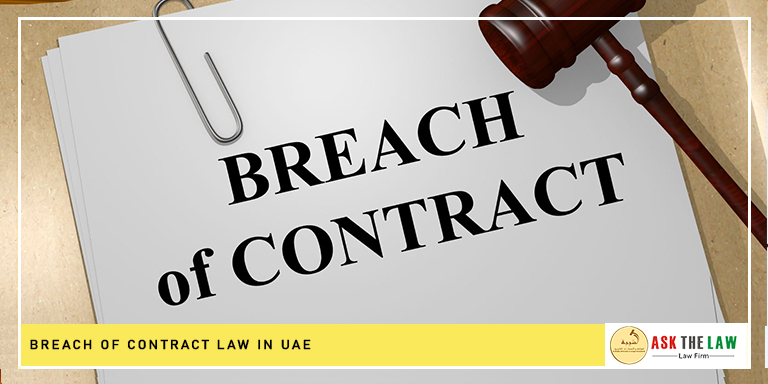
Breach of Contract Law in UAE
As per law, a breach of contract occurs when one party fails to fulfil the requirements or obligations of the agreement and it harms the other party or deprives the party of his legitimate and contractual rights. All the contracts in United Arab Emirates, are governed by the UAE Civil Code (Federal Law No. 5 of 1985). These are also governed to a certain extent, by UAE Commercial Transactions Law. So, it means UAE Civil Code and UAE Commercial Transaction Law govern all the contracts in UAE. Today’s article is about the “Breach of Contract Law in UAE”. It is very important to know about the breach of contract under UAE Law, so ultimately corporate and individual business rights could be protected. Let’s find out the types of breach of contracts first.
What are the Types?
There can be found several types. But we will throw the light on the most common types only.
- Non-performance: This is a type in which one party is found a complete failure while performing the obligations, specified in the contract. It is called as an absolute failure.
- Delay: There is a timeline to perform the obligation and deliver the services or results from your side. If a delay occurs then it is called a delayed performance. It becomes breach of the contract.
- Defective products: When quality is compromised. When one party promises to deliver a certain type of product and service, but the party fails to provide exactly the same level. This type of breach of contract is known as a defective performance breach of contract.
- Partial delivery: The party fulfils just part of the obligations. It means the full obligation is not met and instead part of the obligation is performed.
What are the Legal Options:
If there has been a breach, then the non-breaching party has options provided by UAE law to protect their rights and interests.
- Order to complete the job: This is a legal option which is awarded when the only solution available is to finish the job. If there is no alternative to a job or compensation is also not possible then the law orders to complete the job at any cost.
- Damages are possible: Usually, the non-breaching party wants compensation. Article 386 of the UAE Civil Code allows the non-breaching party to seek compensation for their losses. These damages can be classified as Compensatory and Consequential. Compensatory damages are about providing the same position, status or value which was before the loss. Consequential damages deal with damages like reputation etc. All the intangible losses are covered by inconsequential damages.
- Contract Termination and Penalties: The non-breaching party can also seek to terminate the contract. Article 271 of the UAE Civil Code provides grounds where the non-breaching party can seek the full contract termination. However, termination clauses might contradict too with the rights of the non-breaching party. Penalties can be a remedy if written in the contract. Clauses about penalties written in the contract can be enforced as per Law. allows the courts to consider this clause in the court but courts are also given the right to adjust the rate or number of penalties. Check penalties and the details with our lawyers and legal consultants.
Good Faith is mandatory
Good faith is mandatory. UAE law emphasizes this principle of good faith. The law suggests that both parties must be added in good faith in the contract. Bad faith, can lead either or both or all the parties to additional liabilities. Check additional liabilities with our lawyers and legal consultants.
Reduce the Damages: Responsibility of Non-breaching party
UAE Law also suggests that the non-breaching party has to reduce or mitigate the damages. If one party is making mistakes or delaying while providing the promised products or services then, it is also a moral duty of the non-breaching party not to keep silent and try reducing the damages and risks instead.
Force Majeure
Force Majeure is a claim which removes unseen or uncontrolled liabilities. The Force Majeure concept is recognized by UAE Law. Article 273 of the UAE Civil Code outlines it and states that when the contract becomes impossible to perform, then the contract can be fully or partially terminated.
Time Period
Civil contracts, do have a limitation of 15 years, as per Article 473 of the UAE Civil Code. Commercial contracts do have a limitation of 10 years. Any unacceptable time period to complete a contract is also considered, null or void or breach of contract.
Conclusion
Breach of contract is recognized as quite a serious matter. The law defines remedies, penalties, damages, responsibilities, and legal framework. The law states that first each and every aspect should be defined in a contract and second there should no breach of contract. If the breach is found and provided by law, then the accused party also has to bear the consequences created by UAE Law.
Reade More: Contract Laws in UAE


